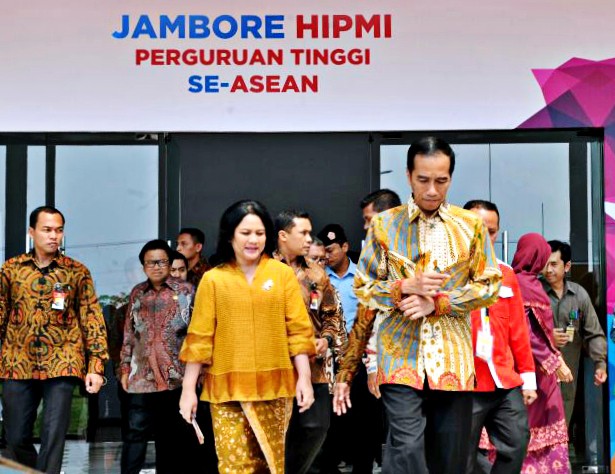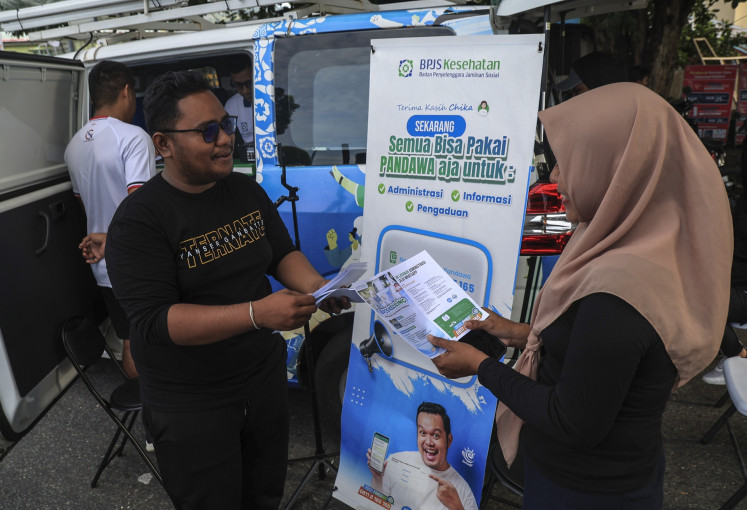Popular Reads
Top Results
Can't find what you're looking for?
View all search resultsPopular Reads
Top Results
Can't find what you're looking for?
View all search resultsYouth entrepreneurs driving a post-pandemic green recovery
The pandemic has given us a rare chance to redesign our economic template and transform it into a growth model that better protects our planet.
Change text size
Gift Premium Articles
to Anyone
W
hen it comes to rebounding from the economic slowdown triggered by the COVID-19 pandemic, Indonesia should look no further than tapping into its biggest resources – the country’s 60 plus million young and productive population, particularly the young entrepreneurs.
But as the effects of the pandemic went beyond human health, the crisis has amplified existing threats of climate change, with pollution and extreme weathers playing a key factor in worsening human wellbeing. Our recovery path should therefore put youth entrepreneurs at the center of climate discussion, as we seek to cut emissions and reduce consumption.
Strong involvement of youth entrepreneurs on green recovery makes full sense as entrepreneurship in Indonesia has long been a magnet for young people. According to UNDP research in 2019, about 81 percent of Indonesian youth surveyed said they were interested in starting a business. Another survey by the World Economic Forum found that more than one-third of the country’s young people between the ages of 15 and 35 want to become entrepreneurs.
Furthermore, young entrepreneurs in Indonesia have been building the startup landscape with more than 2,000 registered startups in 2019 alone, including several US$1 billion unicorns and even a $10 billion decacorn.
UNDP and the Citi Foundation colead in youth entrepreneurship program, Youth Co: Lab, which saw more evidence of this potential last week at our third national gathering of youth entrepreneurs. During this gathering, many of Indonesia’s young and most promising entrepreneurs learned from the top experts on how to become Indonesia’s next big economic players.
Youth entrepreneurs under Youth Co: Lab have integrated their business practices with the Sustainable Development Goals. Among them are the women-led Sahabat Sanitasi Nusantara which develops eco-friendly sanitation products to reduce water waste and Pipet Kite, founded by young women producing sustainable straws. The other common feature is the use of digital technology to expand businesses such as learning application Komerce which has supported more than 1,300 youth on digital marketing.
However, youth enterprises in Indonesia cannot flourish without a transparent business landscape and equal access for all to knowledge, capital resources, as well as comprehensive infrastructure support. One of the key findings from our youth entrepreneurs' national dialogue is that capital owners have a small appetite to invest in young entrepreneurs due to their perceived inability to manage business finance and low financial literacy rate. This perception was given credence by a recent survey conducted by the Financial Services Authority (OJK) which reveals that less than 40 percent of Indonesian youth have strong awareness of financial literacy.
Young entrepreneurs will also rely on digital architecture and public infrastructure to supercharge their moves in green economy. But latest findings from the Ministry of Information and Communication indicate that incubators outside the main island of Java – where public infrastructure is generally more limited – tend to receive less support compared to their counterparts in Java.
This picture of inequality leads to a lost opportunity of more youth working to address Indonesia’s environment and social issues. Improved connectivity and infrastructure outside Java can pave the way for more youth-led business solutions to address greenhouse gas emissions, plastic pollution and the protection of endangered species, among others.
Women entrepreneurs play a key role as we empower young people to become the ‘agents of change’ in our green economic transition. Multiple studies have shown that women have expressed a greater concern for the environment than men.
Special effort must be made to widen women’s participation in the green economy, therefore, to empower women, their leadership, and their participation in the decision-making process. This way, we can contribute to increasing incomes and ultimately improving working and living conditions for both young women and men.
Tapping into women’s voices also leads to a win-win situation for our growth. A recent study revealed that by closing gender disparities, an estimated $4.5 trillion can be added to the gross domestic product to countries in the Asia Pacific alone. It stands to reason then that we must scale up resources for an inclusive green economy where women’s abilities and leadership are fully mobilized.
During our national dialogues on youth entrepreneurship, the Indonesian government reiterated its commitment to boost the youth entrepreneurship ecosystem. A pledge holds us accountable to taking actions. What is needed now is stronger joint actions in narrowing the gap of capital access and knowledge, as well as digital technology development, and improved policies that can incentivize private and public investments into youth entrepreneurship and green sectors.
The pandemic has given us a rare chance to redesign our economic template and transform it into a growth model that better protects our planet. As we take steps now to rebuild from the pandemic, we should share the baton with the youth to accelerate our transition toward a zero-waste and emission-free economic model.
Youth empowerment programs can help equip them with skills to tackle the challenges to achieve a green future. But supporting Indonesia’s transition to a green economy - with young people as the “agents of change” - remains everyone’s joint responsibility.
***
Norimasa Shimomura is UNDP Indonesia resident representative and Batara Sianturi is CEO of Citi Indonesia.










